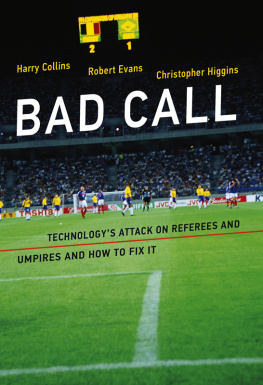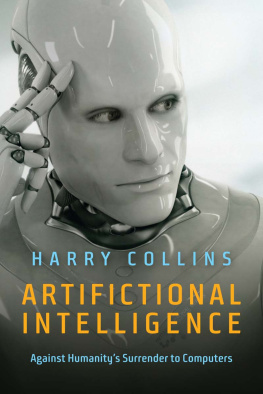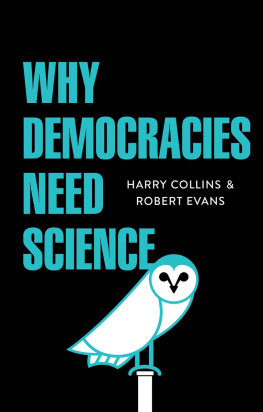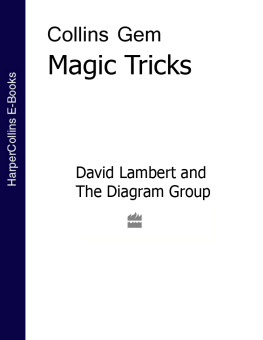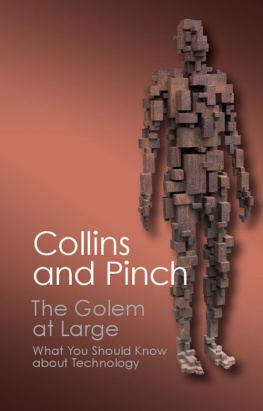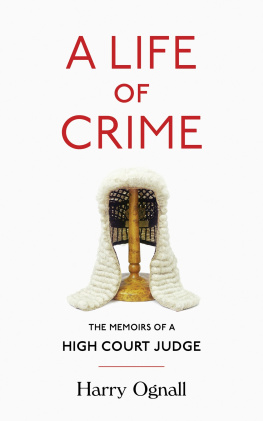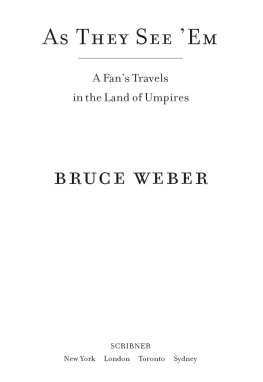Harry Collins - Bad Call: Technology’s Attack on Referees and Umpires and How to Fix It
Here you can read online Harry Collins - Bad Call: Technology’s Attack on Referees and Umpires and How to Fix It full text of the book (entire story) in english for free. Download pdf and epub, get meaning, cover and reviews about this ebook. year: 2017, publisher: The MIT Press, genre: Science. Description of the work, (preface) as well as reviews are available. Best literature library LitArk.com created for fans of good reading and offers a wide selection of genres:
Romance novel
Science fiction
Adventure
Detective
Science
History
Home and family
Prose
Art
Politics
Computer
Non-fiction
Religion
Business
Children
Humor
Choose a favorite category and find really read worthwhile books. Enjoy immersion in the world of imagination, feel the emotions of the characters or learn something new for yourself, make an fascinating discovery.
- Book:Bad Call: Technology’s Attack on Referees and Umpires and How to Fix It
- Author:
- Publisher:The MIT Press
- Genre:
- Year:2017
- Rating:3 / 5
- Favourites:Add to favourites
- Your mark:
- 60
- 1
- 2
- 3
- 4
- 5
Bad Call: Technology’s Attack on Referees and Umpires and How to Fix It: summary, description and annotation
We offer to read an annotation, description, summary or preface (depends on what the author of the book "Bad Call: Technology’s Attack on Referees and Umpires and How to Fix It" wrote himself). If you haven't found the necessary information about the book — write in the comments, we will try to find it.
Bad Call: Technology’s Attack on Referees and Umpires and How to Fix It — read online for free the complete book (whole text) full work
Below is the text of the book, divided by pages. System saving the place of the last page read, allows you to conveniently read the book "Bad Call: Technology’s Attack on Referees and Umpires and How to Fix It" online for free, without having to search again every time where you left off. Put a bookmark, and you can go to the page where you finished reading at any time.
Font size:
Interval:
Bookmark:
Inside Technology
edited by Wiebe E. Bijker, W. Bernard Carlson, and Trevor Pinch
A list of the series appears at the back of the book.
Harry Collins, Robert Evans, and Christopher Higgins
The MIT Press
Cambridge, Massachusetts
London, England
2016 Massachusetts Institute of Technology
All rights reserved. No part of this book may be reproduced in any form by any electronic or mechanical means (including photocopying, recording, or information storage and retrieval) without permission in writing from the publisher.
This book was set in Stone Sans and Stone Serif by Toppan Best-set Premedia Limited. Printed and bound in the United States of America.
Library of Congress Cataloging-in-Publication Data
Names: Collins, H. M. (Harry M.), 1943- author.
Title: Bad call : technologys attack on referees and umpires and how to fix it / Harry Collins, Robert Evans, and Christopher Higgins.
Description: Cambridge, MA : The MIT Press, [2016] | Series: Inside technology | Includes bibliographical references and index.
Identifiers: LCCN 2016013520 | ISBN 9780262035392 (hardcover : alk. paper)
eISBN 9780262337731
Subjects: LCSH: Sports officiating. | Sports--Technological innovations. | Soccer--Officiating. | Cricket--Umpiring.
Classification: LCC GV735 .C65 2016 | DDC 796--dc23 LC record available at https://lccn.loc.gov/2016013520
ePub Version 1.0
Yeeeeeeeeeeesss! Thats me, Harry Collins, a seventy-year-old university professor, my thirty-eight-year-old son, who works for an economics think tank, and my thirty-five-year-old daughter, a senior civil servant. Were high-fiving and rolling about on the floor. The final whistle has just gone and Liverpool has held on at Anfield, their home ground, to beat Manchester City and put the Premiership title in their own hands. Its Sunday, April 13, 2013, and weve been watching the telly at a friends house in London, where my kids live. My wife has gone home to Cardiff on the train because she cant stand the tension and she doesnt want to see me have a heart attack. Insanity!
But Manchester City fans must be, as the football community says, gutted. Not only because theyve lost, but because theyve been cheated. There should have been three penalties in that game, and none of them were given. Citys Vincent Kompany put two hands around Liverpools Luis Surezs chest and pushed him to the ground in the penalty area; Liverpools Mamadou Sakho took a kick at the ball and missed it, hitting a City player instead; and Liverpools Martin krtel simply punched an incoming ball out of the penalty area with his fist even though hes not the goalkeeper and is not allowed to touch it with his hands. If those three penalties had been given, the match would have been a draw and City would still have had the Premiership title in their hands.
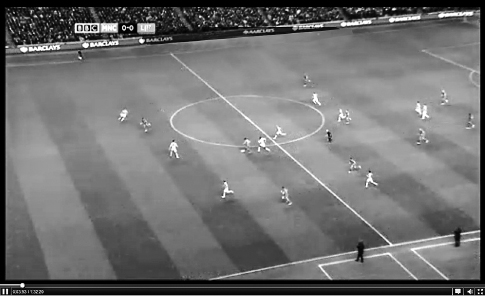
Figure 0.1 Manchester City 2, Liverpool 1, December 26, 2013. Raheem Sterling is miles onside as the ball is passed to him; he was flagged offside.
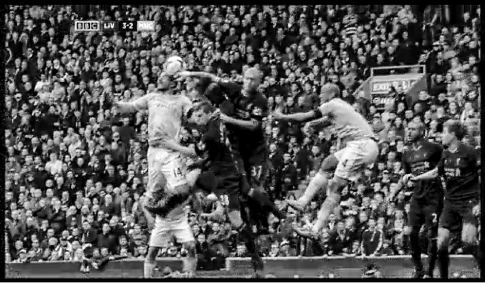
Figure 0.2 Martin krtel punches the ball out of the Liverpool penalty area. It was not spotted by the referee.
Are we saddened by the fact that we won by foul means? Nowere whooping! First, because football fans like to win however it is done. But more importantly because this balances out what happened earlier in the season, when we played City at their stadium in Manchester. Liverpools Raheem Sterling was through on goal and would surely have scored but was flagged offside when he was two yards onside. City won, when it should have been a draw. What we saw on this occasion was the play of chance giving us justice. We should have had two more points at the Etihad, and City should have had two more points at Anfield. As they say, It all balances out in the end.
At least, thats what most people say, but it isnt true; and this book will prove it. What actually happens is that football fans are cheated, week after week. It is not only football fans, of course. On June 2, 2010, Armando Galarraga of the Detroit Tigers pitched a nearly perfect baseball game (it would have been only the twenty-first ever at this level) that was spoiled by an incorrect call, obvious to TV viewers and still obvious on the TV replays accessible on the Web; the runner was clearly out but the umpire called him safe (see https://en.wikipedia.org/wiki/Armando_Galarraga%27s_near-perfect_game). The umpire even admitted, I just cost that kid a perfect game. But the baseball authorities learned their lesson, and since 2014 instant TV replays are available to baseball umpires. We will argue among many other things that they should be introduced in football.
Going back to football, we say fans are cheated because the lung-bursting effort and gut-wrenching emotion they imaginatively share with their teams is, as in the case of the Galarraga incident, made futile by clearly mistaken refereeing decisions. Ten million hearts are broken every week, and they do not need to be. Cheated is a strong word. The referees are not cheating; they are doing their best, and they often suffer along with the fans. Jim Joyce, the umpire who made the wrong call in the Galarraga incident described above, immediately felt terrible. In the book he wrote with Galarraga, he remarks that even though his mistake was not shown on a big screen, just a few moments later he felt humiliated as the fans were watching it on handheld devices and smaller monitors around the stadium (Galarraga and Joyce 2012, 212). A little after the game in conversation with reporters, he writes that he said I feel like I took something away from that kid and I dont know how to give it back. And then he writes, The rest is a bit of a blur because I break down at this point. Right then and there I start crying (217). The players may cheat from time to time, but they too are not cheating the fans; they are trying to do their best for them.
Rather, it is the football authorities who are cheating the fans, because they could easily fix the problem but they wont. In this book well explain how they could easily fix it. Well ask why there has been such a fuss over the introduction of goal-line technology, used to determine whether a ball has completely crossed the goal line, when, in the 201112 and 201213 Premiership seasons, as far as we can see from the work presented in chapters 5 and 7, it could have corrected only five mistakes in total, and in the 201314 season, when it was brought into use, it resolved only six doubtful cases. Thats a maximum of eleven cases in three seasons. In those same three seasons we will be asking why, given our way of assessing these things, nothing was done about 161 incorrect penalty decisions, 86 incorrect offside decisions where goals were at stake, and 88 wrong decisions regarding red cards followed by sending offsall crucial to the outcome of the games. Of course, you will have to decide for yourself if our way of assessing things is right, but even if its miles out it still makes goal-line technology pretty well irrelevant, while almost the entirety of what is going wrong can be fixed quite simply. Positions in the league table can change based on a point or even a single goal, so well ask why, based on our calculations, individual clubs in the Premiership were cheated of up to a net nine points in the 201112 season or were unfairly awarded up to ten, cheated of up to seven points in 201213 and unfairly awarded up to six, and in the 201314 season were cheated of up to nine points and unfairly awarded up to eight. Well show that if these wrong decisions had been corrected, different clubs would have won the Premiership, different clubs would have filled the Champions League places, and different clubs would have found themselves in the relegation zone. So things didnt all balance out in the end. And well show how easy it would be to put all this right and let the players skill and effort decide the outcome of football matches rather than referees bad calls.
Next pageFont size:
Interval:
Bookmark:
Similar books «Bad Call: Technology’s Attack on Referees and Umpires and How to Fix It»
Look at similar books to Bad Call: Technology’s Attack on Referees and Umpires and How to Fix It. We have selected literature similar in name and meaning in the hope of providing readers with more options to find new, interesting, not yet read works.
Discussion, reviews of the book Bad Call: Technology’s Attack on Referees and Umpires and How to Fix It and just readers' own opinions. Leave your comments, write what you think about the work, its meaning or the main characters. Specify what exactly you liked and what you didn't like, and why you think so.

